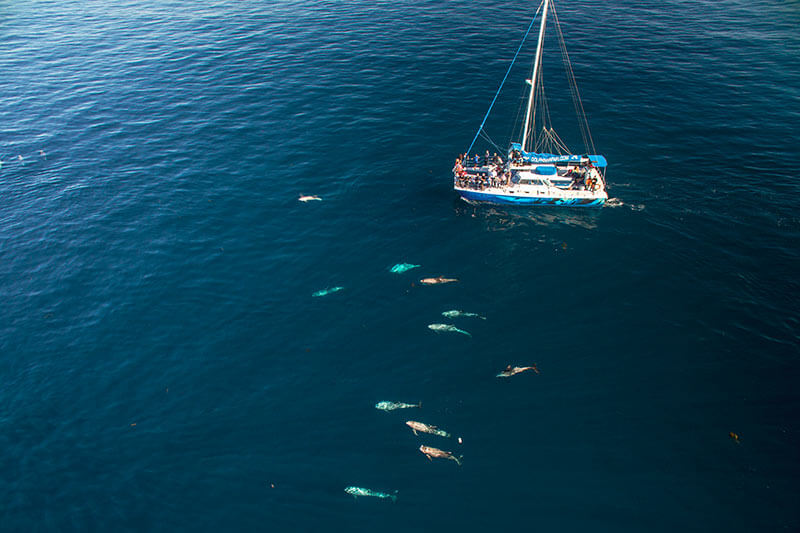Risso’s Dolphin Fast Facts
Scientific name: Grampus griseus
Class: Mammalia
Average length: 8.5 to 13 feet
Average weight: 660 to 1,100 pounds
Cruising speed: 5 to 10 mph
Gestation period: 13 to 14 months
Average lifespan: At least 35 years
Best time to see Risso’s dolphins in Southern California: Year-round
Risso’s Dolphins: Dive Deeper
Risso’s Dolphins. An incredibly unique name for such an incredible and unique dolphin species! Risso’s dolphins are named after Antoine Risso, a French naturalist who also has species of sea snails named after him.
Risso’s dolphins, scientifically known as the Grampus griseus, are cetaceans in the dolphin family which includes members such as common dolphins, pacific white-sided dolphins, and bottlenose dolphins. They are also considered part of a similar subfamily commonly known as “blackfish” that include species such as false killer whales, pilot whales, melon-headed whales, and pygmy killer whales.
Where can Risso’s dolphins be found?
Although similar in many respects, Risso’s dolphins are quite different from their ocean loving relatives. Found in various temperate and tropical waters, these dolphins prefer offshore deep waters, where they can hold their breath for up to 30 minutes while diving to depths of up to 1,000 feet below the surface. These waters include areas in the Gulf of Alaska to down along the west coast of the United States such as Monterey Bay and Southern California, extending to areas outside the US such as the Gulf of Mexico, Norway, Japan, and Russia. Traveling the globe at speeds of up to 5 to 10 miles per hour, they especially prefer to hang about near the continental shelf edge and slope.
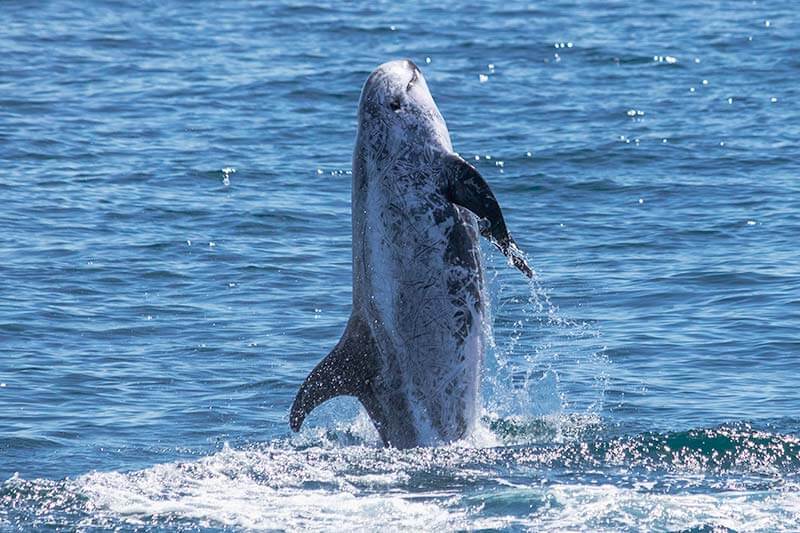
Appearance
Among all of the marine mammals out at sea, these friendly swimmers are some of the most unique. Weighing between 660 to 1,110 pounds and reaching lengths of up to 13 feet long, they sport-up a robust frame with a narrow tailstock. Both males and females are generally the same sizes, with each having a rounded bulbous head with no distinguishable beak, unlike their distant cousins such as the common dolphin. Midway down their backside, they have a fairly tall and curved dorsal fin which can be spotted above the surface while their sturdy bodies cruise about the deep blue.
Especially unique to this specific species is the coloring of their robust frames. When born, they appear with a dark gray, black, or brown coloration which changes into a pale gray and almost white tone as they age, sort of like us! Their “mature” coloring is often accompanied with a plethora of scars all along their front and backside. Many passengers who spot these unusual markings ask, “Why do Risso’s dolphins have scars?” These scars are collected throughout the years all thanks to the teeth raking of other Risso’s, as well as from their favorite prey. This peculiar way of interacting between Risso’s is a very interesting way to connect, yet it does not impede their social units.
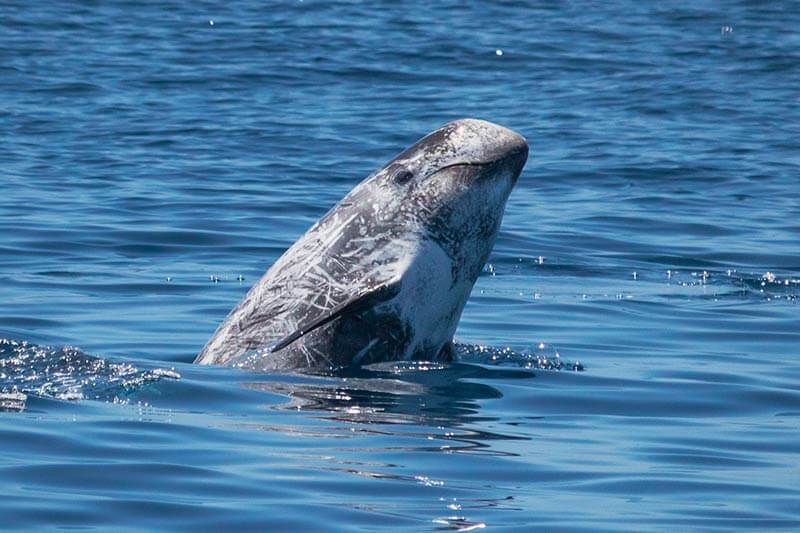
Diet
Glammed up with a grill of two to seven pairs of peg-like pearly whites in the front of their lower jaw with none in the upper jaw, these animals use this peculiar set of gnashers to snatch up their preferred prey. One may ask what do Risso’s dolphin eat with this fun set of teeth? A Risso’s dolphin diet consists of several deep sea menu picks such as cookie-cutter sharks, octopuses, lampreys, and their most favorite; squid. They will also occasionally dine on fish such as anchovies, krill, and cephalopods. Yum!
Risso’s Dolphin Lifespan and Reproduction
Both male and female Risso’s dolphins live up to 35 years.
When it comes to their reproduction habits, not much is known. Rather than becoming sexually mature at a specific age, they reach full sexual maturity when they grow to a length of 8.5 to 9 feet. Depending on what waters they touchdown in, their breeding and calving season may vary. In Japan, their calves are usually born from summer to fall, whereas, in California waters, they are born from fall to winter. Gestation lasts anywhere from 13 to 14 months, and each calf weighs up to 45 pounds and measures in at 3.5 to 5.5 feet long.
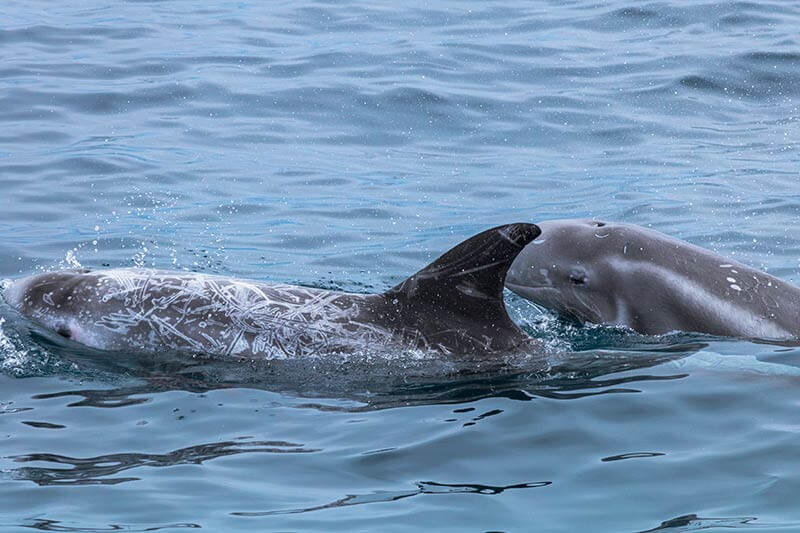
Socialization and Communication
Risso’s are often found in groups known as pods containing males and females that range in numbers from 10 to 30 individuals, and can also be spotted flying solo as solitary. Although very shy and timid, they have been known to interact with other species such as gray whales, northern right whale dolphins, and lively bottlenose dolphins.
When it comes to the personality and demeanor of this species, they can be very intriguing to many onlookers as they are different from other dolphins who often bow-ride with our whale and dolphin watching vessels, while showing off acrobatic tricks and flips. Risso’s very rarely bow-ride like other dolphins, and we assume their tricks are reserved for their deep sea snack roundups.
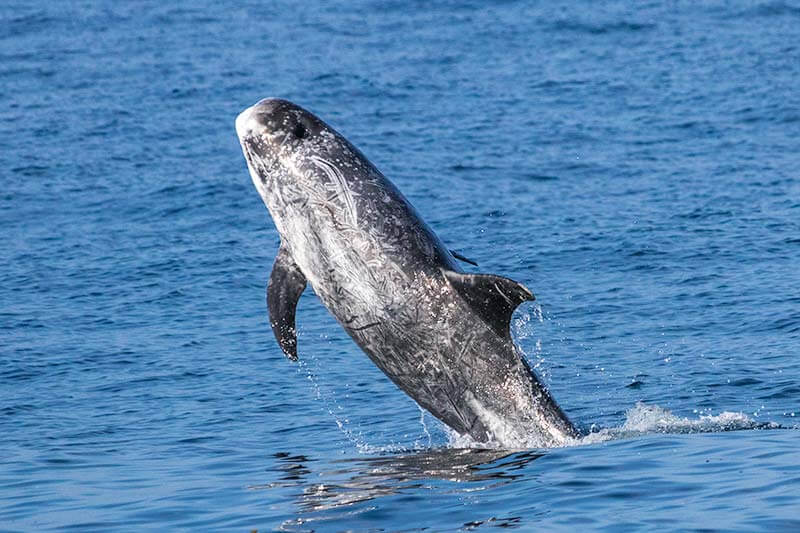
Although fairly shy and timid with us, it does not deter them from making visits throughout the year. In Dana Point, California, Risso’s dolphins can be spotted anytime during the calendar months and their visits are always exciting. The ooh’s and aah’s abound as curious passengers take an up-close peek at their remarkable rake marks and friendly faces.
